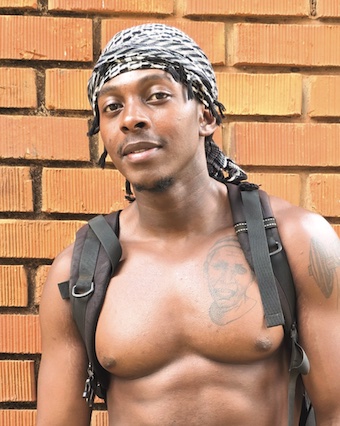
Screenshot

Aziz Kayihura, better known as SHIRTLESS BOSS, is a social media content creator and artiste who has turned his struggles into a mission to uplift ghetto talent.
From the ghettos of Katwe to building a platform for fellow youth, he is proving that even those from the humblest beginnings can dream big, and make an impact.
Quick Talk found him in the ghet- tos of Kawempe where he shared his journey, dreams and vision.
Why the name Shirtless Boss?
I called myself Shirtless Boss because I represent the muntu wa wansi (common man).
So, being shirtless means we are bare and have nothing. The common people I represent, especially the youth, are good people but they are not living a good life. So, moving around shirtless like this is my way of showing the plight my people, especially those in the ghettos, live in.
I even refused to buy a car, and I use a motorcycle so that I can remain relatable with my people.
For someone hearing about ‘Shirtless Boss’ for the first time, what do you do?
I am an independent artiste, producer, videographer and graphics designer. I am trying to show the world that even someone from the gutters of the ghetto can do something useful because most people despise us. That is why I sacrificed my hard-earned money and bought equipment which I use to create content that uplifts the lives of the communities I stay in.
I want to show the world that even us from under-privileged backgrounds have the ability to do great things.
How did you get the money to purchase your equipment?
In the ghetto, our minds are always sharp and we utilize every opportunity which comes by. So, I got an opportunity of going to work abroad.
All the money I made from there is what I used to buy cameras, phones, laptop and mics to use for my content. I went in 2015 and came back in 2022. I worked in countries such as Thailand, China, Turkey and United Arab Emirates as a security guard, safety officer, cleaner and office messenger.
While there, I literally never rested. I was very determined to make that money and when I felt like I had collected enough to kickstart my career, I came back home.
Where did you grow up?
I grew up in Kampala. I was born in the slums of Katwe, but when I was still young, the area we were staying in was demolished and we relocated to Kawempe and that is where I grew up, mostly. Life was hard and I was forced to grow up quickly.
I was just nine years old but had already started taking care of my family as a man. I hawked tomatoes, onions, sugar and salt on the streets of Kampala.
Oh dear! And when did you start making music?
I started singing at a young age. I remember while still staying in Katwe, my friend and I wrote a song.
We walked up to WBS TV [now defunct], went to the reception and told them we had a song. They asked us for a flash disc with the song and we didn’t have it. We thought a person just goes there, sings for them and that’s it.
We didn’t know that you go to a studio and record the song. However, after sometime, I discovered that even though I loved my music, my purpose was more into uplifting others’ talents and that is what I am concentrating on.
Who are some of the people you look up to?
The only person I look up to right now is myself, Shirtless Boss, because I’ve learned to stop wishing for myself alone and instead focus on wishing others well. By uplifting others, I also find strength and inspiration within myself.
You also do freestyle content especially in the ghettos; why did you start doing that?
I started doing that because there is a lot of raw talent in the ghettos which only needs to be polished.
From musicians to sportsmen, the best talents come from there. Since I have grown up with them, it was only fair that I start with them. I blend in so well with them because I am one of them.
And how is all this helping the ghetto youth?
My work has helped many youths discover their talents and some of them are now real musicians who even get booked for shows, others are voice-over artistes who are getting gigs to voice adverts.
I believe I have been able to create a platform for them to uplift their talents. However, I also want to appeal to big artistes out there to spot these talents, work with them and give them exposure because this is a huge burden for me to carry as an individual; so, getting help from someone who is already established in the entertainment industry can go a long way in helping these young people fulfill their dreams.
We just need more hands on deck. Some of us are trying to uplift our fellow ghetto youth but many people still undermine them. There is need to give them exposure, mentorship and the right resources to grow.
Many of them have raw talent, but without platforms to showcase their skills, they remain unseen. We need more affordable creative spaces like community studios, as well as training in areas such as music production, branding and entrepreneurship so they can build sustainable careers.
What are some of your future dreams?
I want to build my brand so that everyone across Uganda knows who Shirtless Boss is. I want to have some acres of land where I can do farming and animal grazing as my retirement plan.
On a more personal level, I aspire to build more muscle and maintain a strong, healthy and confident physique [yeah, it takes real guts and a good body for one’s brand to be walking around shirtless!]
Any last words to the ghetto youth?
I want to advise my fellow youth to stay away from crime and drug abuse, and instead choose to obey the laws of the land.
Most importantly, I encourage them to focus on their future, because right now they have all the energy and potential they need to work hard, build themselves, and achieve their dreams. [Hmmm, Quick Talk ponders as the interview ends, these are the serious presidential advisors the president would need on ghetto matters…but again, what does Quick Talk know!]
devonssuubi@gmail.com



